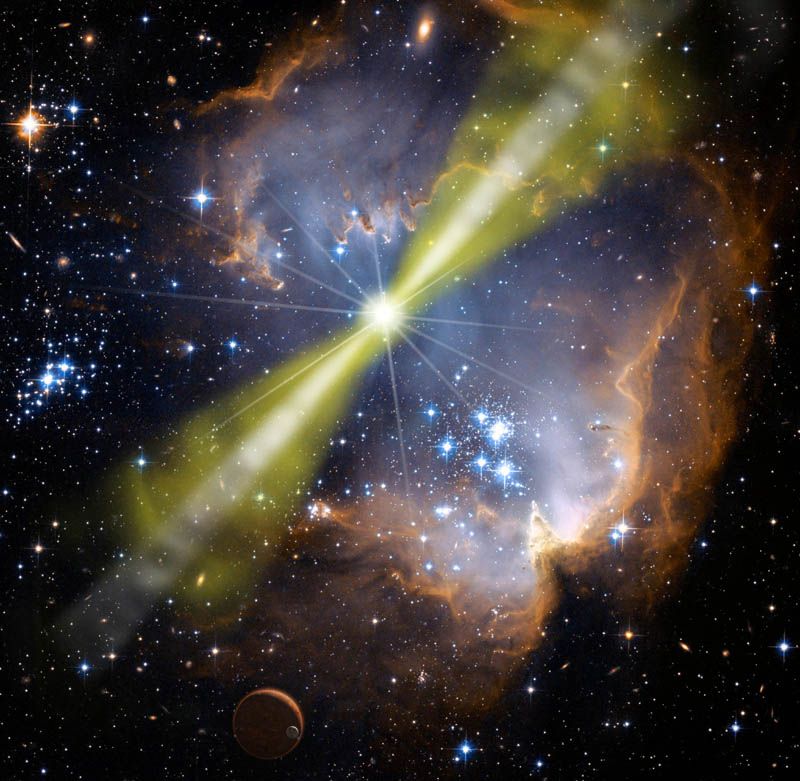
Scientists have recorded a gamma ray burst, describing the event—one of the most explosive and energetic in the universe—in unprecedented detail.
Gamma ray bursts, or GRBs, come from newly formed black holes, regions of space that spew jets of ionized matter at nearly the speed of light. The power of these jets produces brief but extremely intense flashes—GRBs.
The intensity of the pulses has led scientists to theorize they may have been responsible for mass extinction on Earth billions of years ago, and that if a GRB were pointing in the right direction, such an event could happen again. That possibility would be reason enough to improve our understanding of this phenomenon.
But these bursts are incredibly short lived, lasting as little as a few milliseconds, so studying them is extremely difficult. Eleonora Troja, an astrophysicist with NASA and lead author a new study on the phenomenon, explains that the process can emit as much energy as a star the size of our sun would in its entire lifetime—in a matter of seconds.
The new study, published in Nature, provides the most detailed description of a GRB to date. "Gamma-ray bursts are catastrophic events, related to the explosion of massive stars 50 times the size of our sun," said Troja, in a staement. "If you ranked all the explosions in the universe based on their power, gamma-ray bursts would be right behind the Big Bang,"
The event, GRB160625B, was initially recorded in June last year after it was picked up by NASA's Fermi Gamma-ray Space Telescope. This pulse lasted less than a second. Soon after, scientists began follow-up observations of the region of space it came from. Three minutes later, they recorded a pulse lasting 30 seconds. During that brief moment, the brightness of the GRB increased by a factor of 100, and then faded steadily.
Since they had a recording of the event, scientists have analyzed the GRB to better understand how it changed over time. While this study does not give a complete picture of what happens when black holes eject this ionized matter, it provides a far better insight of these events than was previously known.
Results indicate that a black hole first produces a strong magnetic field that drives the jets being emitted. When the magnetic field breaks down, matter takes over, dominating the jets. This observation is contrary to what scientists had previously thought. Prior work had led to the hypothesis that jets were driven by either the magnetic field or matter, but not both.
Troja explained: "There has been a dichotomy in the community. We find evidence for both models, suggesting that gamma-ray burst jets have a dual, hybrid nature. The jets start off magnetic, but as the jets grow, the magnetic field degrades and loses dominance. Matter takes over and dominates the jets, although sometimes a weaker vestige of the magnetic field might survive."
Alexander Kutyrev, co-author of the paper, added: "Gamma-ray bursts occur at cosmological distances, with some dating back to the birth of the universe. The events are unpredictable and once the burst occurs, it's gone. We are very fortunate to have observations from a wide variety of sources, especially during the prompt phase, which is very difficult to capture."
Uncommon Knowledge
Newsweek is committed to challenging conventional wisdom and finding connections in the search for common ground.
Newsweek is committed to challenging conventional wisdom and finding connections in the search for common ground.
About the writer
Hannah Osborne is Nesweek's Science Editor, based in London, UK. Hannah joined Newsweek in 2017 from IBTimes UK. She is ... Read more
To read how Newsweek uses AI as a newsroom tool, Click here.








